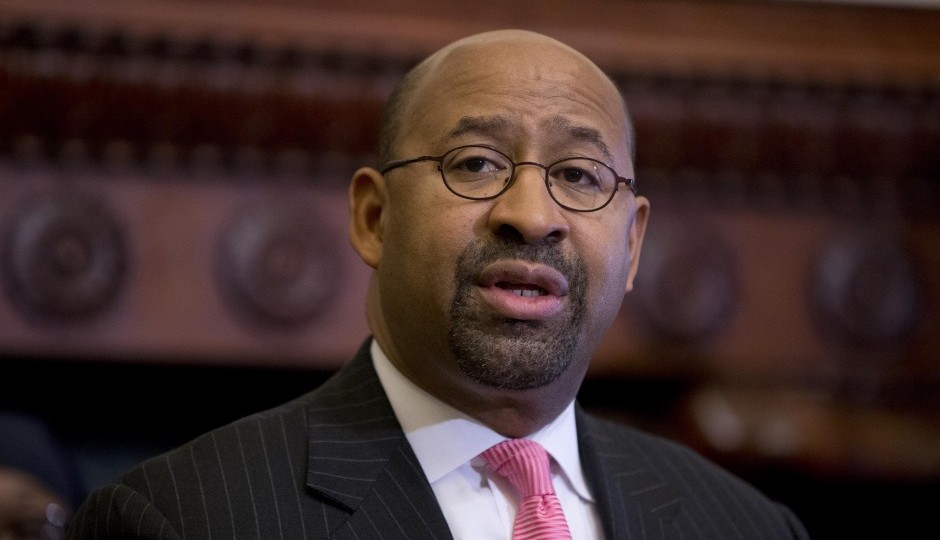The Brief: Why the Next Philadelphia Mayor Matters More Than the Next President

This guy has more to say about Philadelphians’ economic mobility than President Obama. Matt Rourke | AP
In presidential elections, Philadelphians turn out. Over 690,000 Philadelphians helped re-elect President Obama in 2012. Four years earlier, 718,000 showed up at the polls. Those are pretty solid numbers.
When it comes to mayoral elections, though, Philadelphians really can’t be bothered. A piddling 183,000 cast votes in the 2011 general mayoral election. It’s a bit better when there’s a competitive primary, like Nutter’s first election, where 291,000 cast ballots. But that’s still a fraction of the presidential total, and nobody’s expecting turnout this year will actually top 2007.
Which is really stupid, and a shame, because local officials have far more influence over the lives of the people they serve than do the high-and-mighty in Washington D.C.
Vox’s Danielle Kurtzleben makes that point convincingly in a story headlined “Mayors hold the real key to the American Dream.” Zooming in on social mobility—or, the chance that kids can live better, more prosperous lives than their parents—the Vox article, building off other studies and reporting, shows how social mobility varies significantly from metro to metro. Growing up in Seattle gives kids a better chance of moving from low-income to middle class than does, say, growing up in Atlanta.
Right now, Philadelphia lands in the middle of the pack, about the norm for the mid-Atlantic, but a shade worse than the rest of Pennsylvania and the Northeast.
The Vox article argues that mayors and City Councils have far more ability to enhance social mobility than do presidents, even though social mobility is shaping up as one of the big issues of next year’s presidential campaign. And it makes sense. Education is central to social mobility (remember, in most cities, the school board is locally controlled). So are economically and racially desegregated neighborhoods, which are best achieved either organically or through local housing and economic development policies. And there’s more: smart transportation policies are thought to enhance economic mobility, so is public safety, even access to park space. And all this is the stuff of mayors and city councils, not presidents.
The point? The election of the next Philadelphia mayor matters, and probably will do more to determine the fortunes of Philadelphians than will the selection of Obama’s successor.
And so (pardon the forced transition), you simply must show up tonight, despite the cold, for the first of Philadelphia magazine’s Candidate Conversations. Citified’s Holly Otterbein will interview Doug Oliver, the fresh-faced candidate that Ed Rendell likes so much. Is he up to the job? Is he the change Philadelphia needs? Come find out for yourself tonight at 6 p.m. at Venturef0rth, 417 N. 8th Street. There will be drinks and snacks and smart company. The event is free. Just RSVP here.
Don’t Miss…
- Michael Smerconish cracks open David Axelrod’s new memoir and excavates the scene around The Bug. For city newcomers, that was the episode on Oct. 3, 2003, when a police surveillance team found an FBI bug in Mayor John Street‘s City Hall office ceiling, a month out from his re-election bid against Sam Katz. One might think such a discovery would, you know, harm the prospects of the candidate being surveilled by federal agents. Not so, not in Philly. Street’s team successfully spun the The Bug as the work of big bad Republicans in Washington D.C. out to slime the Democrat Street. Katz never recovered. Axelrod takes a lot of credit for the strategy in his memoir. Katz is having none of it. The whole thing is definitely worth a read for the political obsessives out there.
- The Inquirer’s Andrew Maykuth has a good, thorough look at the prevalence of oil trains in and around Philadelphia. These are the train cars carrying crude oil from the Bakken fields to local refineries (and elsewhere). He’s got some numbers in there I’ve never seen before, including this one: some 700,000 Philadelphia-area residents live within a half-mile of the oil train routes (a half mile is the evacuation zone, in case of an oil train fire). Plus, this map of the oil train routes.
- If education is the premier issue of the mayoral race, then where the candidates send (or sent) their kids to school seems like relevant information. Max Marin has the details for Al Dia.
- The Inquirer’s Alfred Lubano has got hold of a strange story involving the city’s Department of Licenses and Inspections. It seems a private demolition company took down a big chunk of a block, without city permits. The company says it had a court order to do so, but the Nutter administration reassigned the department’s #2 official after getting some questions from Lubrano last week. This feels like one of those stories where the paper knows more than it can print yet.